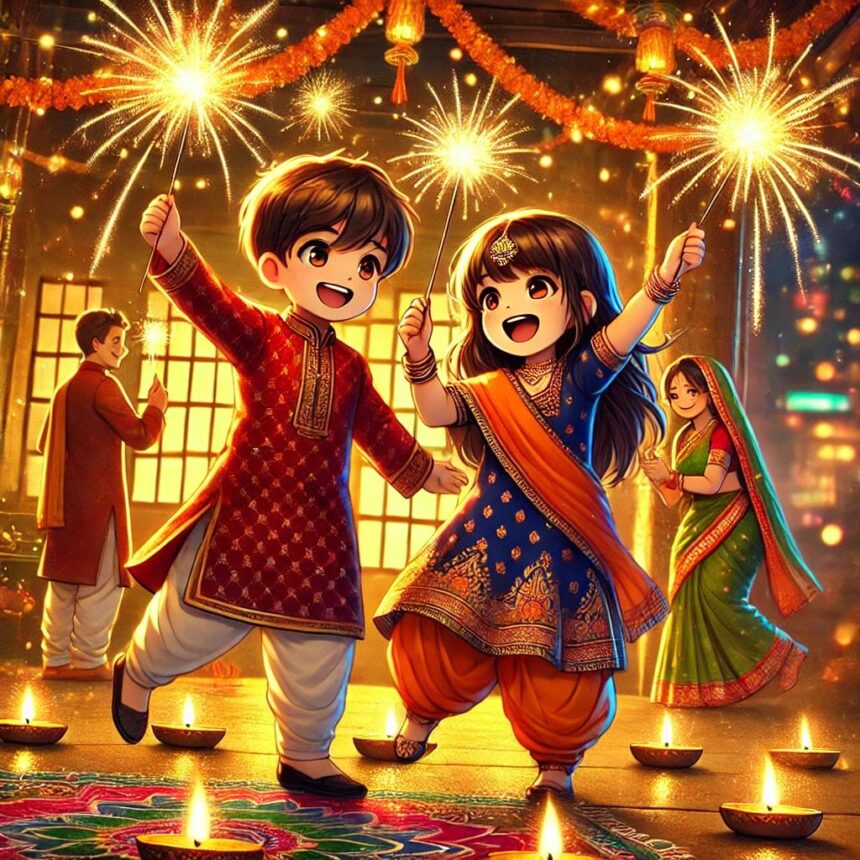Diwali: Overview
Diwali, also called Deepavali, is one of the most vibrant and widely celebrated festivals in India. Known as the Festival of Lights, it symbolizes the victory of light over darkness, knowledge over ignorance, and good over evil.
The festival is celebrated by Hindus, Jains, Sikhs, and some Buddhists, each with their own historical and spiritual significance. Diwali usually falls between October and November, on the new moon day (Amavasya) of the Hindu month of Kartika.
History of Diwali
Diwali has mythological and historical roots in Indian culture:
Return of Lord Rama:
According to the Ramayana, Diwali marks the return of Lord Rama, Sita, and Lakshmana to Ayodhya after 14 years of exile and victory over the demon king Ravana.
People of Ayodhya lit oil lamps (diyas) to welcome them, symbolizing joy and the triumph of good over evil.
Goddess Lakshmi Worship:
Diwali is associated with Goddess Lakshmi, the goddess of wealth and prosperity. Devotees perform Lakshmi Puja to invite wealth, success, and happiness into their homes.
Lord Krishna and Narakasura:
Some regions celebrate Diwali to commemorate Lord Krishna’s victory over the demon Narakasura, symbolizing the destruction of evil forces.
Jain and Sikh Significance:
For Jains, Diwali marks the nirvana of Lord Mahavira.
Sikhs celebrate Bandi Chhor Divas, marking the release of Guru Hargobind Ji from imprisonment.
Significance of Diwali
Spiritual Significance:
Marks the victory of light, knowledge, and righteousness over darkness, ignorance, and sin.
Encourages self-reflection, devotion, and moral living.
Cultural Significance:
Celebrates family bonding, traditions, and community harmony.
People clean, decorate, and illuminate their homes, reflecting joy, purity, and positivity.
Economic Significance:
Diwali is a major festival for trade, business, and markets. It boosts economic activity, especially in retail, sweets, clothing, and gift industries.
Rituals and Celebrations
Diwali is celebrated over five days, each with its own rituals:
Day 1 – Dhanteras
Marks the beginning of Diwali festivities.
People buy gold, silver, utensils, and other valuables, considered auspicious.
Homes are cleaned and decorated.
Day 2 – Naraka Chaturdashi / Choti Diwali
Commemorates Lord Krishna’s victory over Narakasura.
People light small diyas and burst firecrackers.
Day 3 – Lakshmi Puja / Diwali
The main day of Diwali.
Families perform Lakshmi Puja in the evening, offering prayers for wealth and prosperity.
Homes are illuminated with diyas, candles, and colorful rangolis.
Fireworks and sweets add to the festive spirit.
Day 4 – Govardhan Puja / Annakut
Celebrates Lord Krishna lifting the Govardhan hill to protect villagers from floods.
Devotees prepare elaborate food offerings and perform prayers.
Day 5 – Bhai Dooj
Celebrates the bond between brothers and sisters.
Sisters pray for their brothers’ well-being, and brothers bless their sisters.
Symbols of Diwali
Diyas and Lamps: Represent light over darkness and hope over despair.
Rangoli: Colorful patterns drawn at entrances to welcome prosperity and positivity.
Fireworks: Celebrate joy and the victory of good over evil.
Sweets and Gifts: Symbolize sharing, love, and happiness among family and friends.
Impact on Daily Life and Society
Spiritual Growth: Encourages devotion, self-reflection, and moral values.
Family Bonding: Festivals strengthen family and social connections.
Economic Activity: Boosts markets, crafts, sweets, and clothing industries.
Community Harmony: Festivals encourage sharing, charity, and social unity.
Cultural Preservation: Keeps alive traditional art forms, rituals, and regional practices.
FAQs about Diwali
When is Diwali celebrated?
On the new moon day (Amavasya) of Kartika, usually in October or November.
Why is Diwali called the Festival of Lights?
Because homes, temples, and streets are illuminated with diyas, candles, and lights, symbolizing the triumph of light over darkness.
Is Diwali celebrated across India?
Yes, it is celebrated nationwide, though customs vary regionally.
What is the significance of Lakshmi Puja?
It seeks blessings of wealth, prosperity, and success from Goddess Lakshmi.
Why are fireworks an important part of Diwali?
Fireworks symbolize the celebration of joy, victory, and the warding off of evil spirits.
Conclusion
Diwali is not just a festival—it is a celebration of life, light, and positivity. It inspires people to embrace joy, kindness, and prosperity while reflecting on the eternal victory of good over evil. Across homes, streets, and communities, Diwali lights up hearts, minds, and spirits, making it one of the most cherished and awaited festivals in India.








